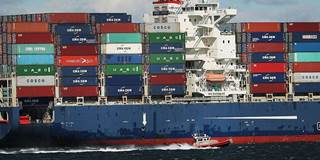As the world’s financial elite converges on Washington, DC, for the annual meetings of the IMF and the World Bank, they cannot escape yet another clarion call to reverse the retreat of globalization. But the assumption that faltering trade is an adverse trend that must be addressed is simplistic, at best.
BRUSSELS – As the world’s financial elite converges on Washington, DC, for the annual meetings of the International Monetary Fund and the World Bank, they cannot escape yet another clarion call to reverse the retreat of globalization. Faltering trade, it is assumed, must be an adverse trend that needs to be addressed. But the assumption is simplistic, at best.
The problem lies in a lack of understanding of what drove trade growth over the last few decades. To be sure, there have been efforts to grasp the current slowdown. The IMF’s latest World Economic Outlook devotes an entire chapter to it.
But no significant new barriers to trade have been identified. Instead, the IMF declares, some three-quarters of the slowdown in trade growth is a result of “overall weakness in economic activity,” especially investment. The Fund also asserts that “the waning pace of trade liberalization and the recent uptick in protectionism” have played a role, though it is not quantifiable.

BRUSSELS – As the world’s financial elite converges on Washington, DC, for the annual meetings of the International Monetary Fund and the World Bank, they cannot escape yet another clarion call to reverse the retreat of globalization. Faltering trade, it is assumed, must be an adverse trend that needs to be addressed. But the assumption is simplistic, at best.
The problem lies in a lack of understanding of what drove trade growth over the last few decades. To be sure, there have been efforts to grasp the current slowdown. The IMF’s latest World Economic Outlook devotes an entire chapter to it.
But no significant new barriers to trade have been identified. Instead, the IMF declares, some three-quarters of the slowdown in trade growth is a result of “overall weakness in economic activity,” especially investment. The Fund also asserts that “the waning pace of trade liberalization and the recent uptick in protectionism” have played a role, though it is not quantifiable.